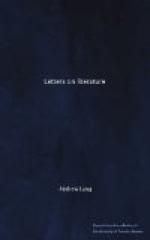“Whose purpose is not missed,
While life endures, while things
subsist.”
Mr. Arnold’s poetry is to me, in brief, what Wordsworth’s was to his generation. He has not that inspired greatness of Wordsworth, when nature does for him what his “lutin” did for Corneille, “takes the pen from his hand and writes for him.” But he has none of the creeping prose which, to my poor mind, invades even “Tintern Abbey.” He is, as Mr. Swinburne says, “the surest-footed” of our poets. He can give a natural and lovely life even to the wildest of ancient imaginings, as to “these bright and ancient snakes, that once were Cadmus and Harmonia.”
Bacon speaks of the legends of the earlier and ruder world coming to us “breathed softly through the flutes of the Grecians.” But even the Grecian flute, as in the lay of the strife of Apollo and Marsyas, comes more tunably in the echo of Mr. Arnold’s song, that beautiful song in “Empedocles on Etna,” which has the perfection of sculpture and the charm of the purest colour. It is full of the silver light of dawn among the hills, of the music of the loch’s dark, slow waves among the reeds, of the scent of the heather, and the wet tresses of the birch.
Surely, then, we have had great poets living among us, but the fountains of their song are silent, or flow but rarely over a clogged and stony channel. And who is there to succeed the two who are gone, or who shall be our poet, if the Master be silent? That is a melancholy question, which I shall try to answer (with doubt and dread enough) in my next letter. {1}
OF MODERN ENGLISH POETRY
My dear Wincott,—I hear that a book has lately been published by an American lady, in which all the modern poets are represented. The singers have been induced to make their own selections, and put forward, as Mr. Browning says, their best foot, anapaest or trochee, or whatever it may be. My information goes further, and declares that there are but eighteen poets of England to sixty inspired Americans.
This Western collection of modern minstrelsy shows how very dangerous it is to write even on the English poetry of the day. Eighteen is long odds against a single critic, and Major Bellenden, in “Old Mortality,” tells us that three to one are odds as long as ever any warrior met victoriously, and that warrior was old Corporal Raddlebanes.
I decline the task; I am not going to try to estimate either the eighteen of England or the sixty of the States. It is enough to speak about three living poets, in addition to those masters treated of in my last letter. Two of the three you will have guessed at—Mr. Swinburne and Mr. William Morris. The third, I dare say, you do not know even by name. I think he is not one of the English eighteen—Mr. Robert Bridges. His muse has followed the epicurean maxim, and chosen the shadowy path, fallentis semita vitae, where the dew lies longest on the grass, and the red rowan berries droop in autumn above the yellow St. John’s wort. But you will find her all the fresher for her country ways.




